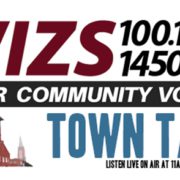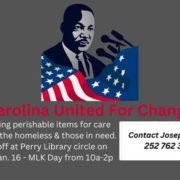The city’s land planning committee and the county’s properties committee held a meeting Thursday afternoon to discuss the disposition of 114 jointly owned properties within the city limits.
The group decided to allow the plan to sell the land to the city to move forward, and that is the recommendation that will go before the full board of county commissioners at its Jan. 9 meeting.
If the board approves the recommendation, the city would buy out the county’s interest in the properties – all are vacant tracts and all are tax foreclosures dating back to 2007, said County Manager Jordan McMillen. The city has a 43 percent interest in the properties and the county holds a 57 percent interest.
The meeting lasted about 90 minutes, with both groups asking questions and sharing opinions about possible future redevelopment of the properties, which McMillen said totals about 26 acres when added all together.
“If it all went back on the tax books today,” McMillen told WIZS News after the meeting’s conclusion, it would add about $4,800 tax dollars to the city and county coffers.
County commissioners Dan Brummitt, Yolanda Feimster, Leo Kelly and Archie Taylor were present for the joint meeting representing the county’s properties committee; Melissa Elliott and Jason Spriggs represented the city of Henderson’s land planning committee.
“I don’t mind transparency or accountability because I feel confident with what I’m doing,” said
Henderson City Manager Terrell Blackmon, who explained the general plan to the group.
Blackmon said the city is ready to ramp up the redevelopment efforts as other projects to piggyback on progress being made with the West End Urban Redevelopment Area and a similar effort getting underway in the Flint Hill community.
In outlining the overall efforts taking shape within the city, he said there are developers knocking on the door to begin projects. When planning for the West End URA, the UNC School of Government reported that the city was 3,000 housing units short of where it needed to be. The city needs housing that is diverse, safe and affordable, Blackmon said. And as the city ramped up code enforcements over the past few years, the result was more torn down houses than houses that were preserved.
By all accounts, both groups supported the idea of having the city move forward with purchase of the properties, but Commissioner Brummitt said it’s time to “pick a project and move – make it happen.”
In comments to the joint group, Brummitt and Taylor both expressed concern that there has been much talk over the years about redevelopment, but little action.
We “continue to talk and talk about it, but we’re not taking any steps,” Brummitt said.
“We have developers on deck that are ready to move,” said Council member Elliott.
Blackmon said the redevelopment would most certainly need to be a mixture of single-family and multi-family structures, as well as a combination of renters and homeowners.
In response to some discussion about neighborhood safety, Brummitt said home ownership would be beneficial. “If you own that property, you’re more committed to it,” he said. Blackmon also commented that home ownership is one way to stabilize neighborhoods.
Elliott said a key component to the redevelopment efforts is educating the community about home ownership.
“If you can pay $1,200 to rent a house, you can pay $1,200 to buy a house,” she said, noting numerous programs available for first-time homebuyers.
Blackmon reminded the group that municipalities don’t build homes, but they can help plan for the types of housing that get built.
“When the municipality owns the dirt, we have some flexibility” in the type of housing we’d like to see in the community.
He used the term “workforce housing” to describe affordable housing options, including those for city employees and others who may choose to live in the same community where they work.
Whether it’s single-family or multi-family housing, the city must be aware of what the community can afford to spend. And developers that build in existing neighborhoods have the opportunity to improve the quality of life for residents who already live there – or who may choose to move there.
CLICK PLAY!










